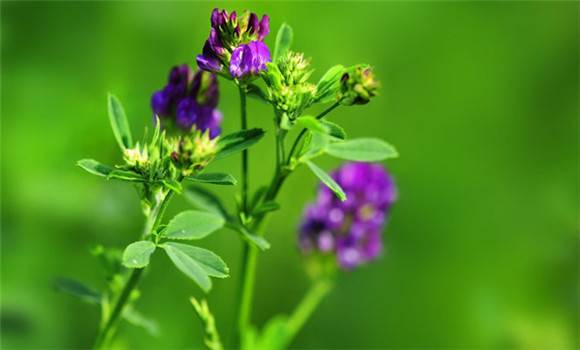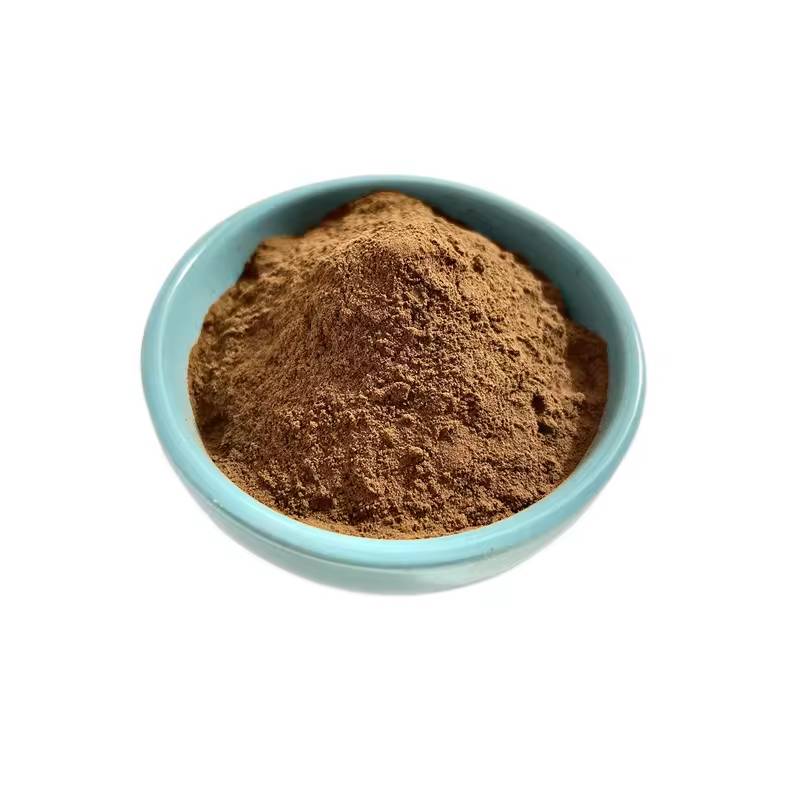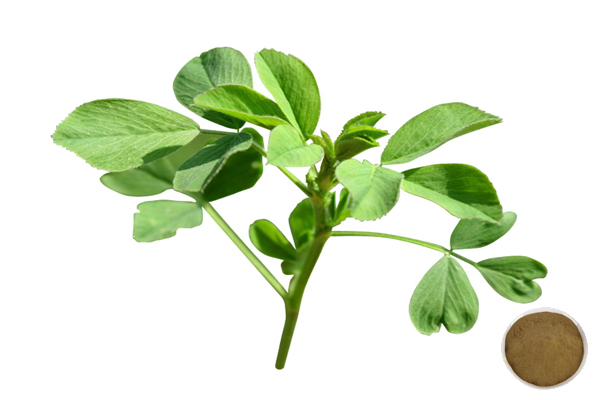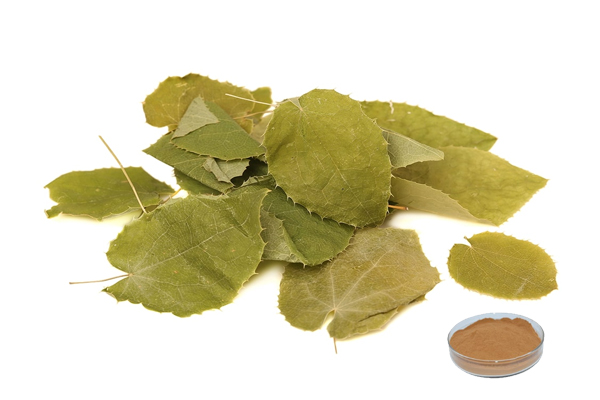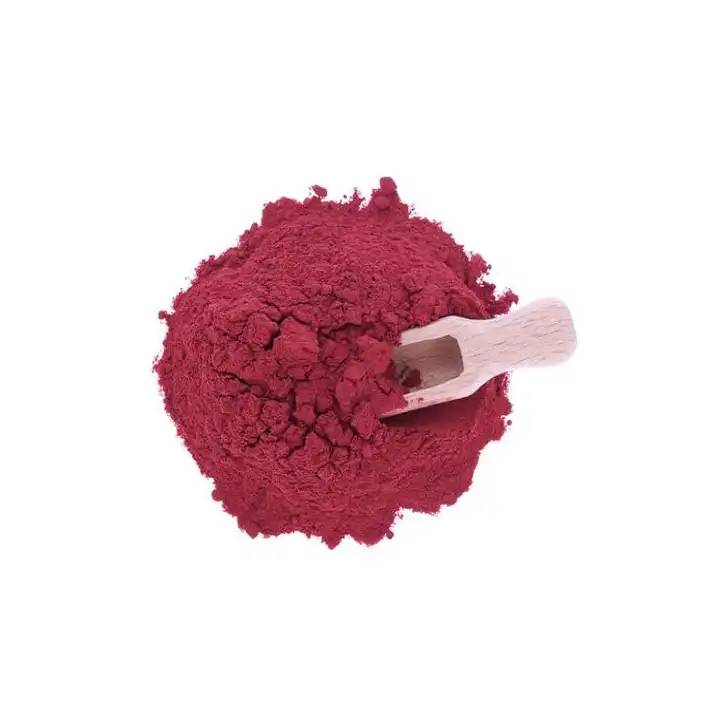Extracto de hoja de Alfalfa 40% de saponinas
Fuente: partes aéreas de Alfalfa
Nombre latino :Medicago sativa L.
Principio activo: saponina Total
Ensayo :40%
Método de ensayo :UV
Aspecto: polvo amarillo marrón
Residuos de plaguicidas: cumplir con la norma (CE) n º 396/2005
- descripción
- Hoja de datos
- Certificado de certificado
-
¿Qué es el extracto de hoja de Alfalfa saponinas?
Extracto de hoja de AlfalfaSaponins are unique bioactive substances extracted from alfalfa, which are cyclic acetals formed by the dehydration and condensation of hydroxyl groups of sugar hydroxyl groups or hydroxyl groups of non-sugar compounds with an acetal chain (glycoside chain). Alfalfa contains nearly 60 kinds of saponin components, all of which are oleanoid-type pentacyclic triterpenes.
El contenido de saponinas en alfalfa varía dependiendo de la especie, sitio y período de crecimiento. Aunque la proporción del contenido total de saponina en flores y semillas es mayor, el rendimiento de ambos es pequeño y bajo, y la proporción del contenido total de saponina en las hojas de alfalfa es casi la misma que en las semillas. Por lo tanto, las hojas son un mejor material para extraer saponinas de alfalfa. El contenido de alfalfa saponin es más alto en la etapa de brote y más bajo en la etapa de marchitamiento. Con la prolongación del ciclo vegetse observó una tendencia a disminuir gradualmente.
La tecnología de primavera verde suministra extracto de hoja de Alfalfa 40% saponinas, que se hace por el corte, extracción, filtrado, concentración, precipitación de alcohol, secado, trituración y cribado proceso. Ha pasado pruebas de identificación foráneas, metales pesados, residuos de disolventes, microorganismos y HAP bajo farmacopea europea, farmacopea japonesa, farmacopea americana y otras normas internacionales.
Fundada en 2000, Green Spring Technology se ha comprometido a proporcionar a los clientes extractos de plantas naturales, seguros y orgánicos. Organiza la producción bajo las normas ISO, HACCP y otras normas de calidad. Ha obtenido 7 certificados y 7 patentes, y sus productos se venden en más de 62 países en todo el mundo, atendiendo a más de 2.450 clientes y son bien recibidos.
Especificaciones:
Nombre del producto
Extracto de Alfalfa
Nombre latino
Medicago sativa L.
fuente
Partes aéreas de Alfalfa
Principios activos
Total saponinas
especificación
40%
Método de ensayo
UV
apariencia
Polvo de color amarillo marrón
Residuos de plaguicidas
Cumplir con la norma (CE) n º 396/2005
Reglamento:
Se ajusta a la normativa de la UE.
¿Busca un presupuesto?Benefits:
Abatement of Atherosclerotic Plaque
Alfalfa extract saponins promote atherosclerotic plaque. NO is known to play a key role in maintaining vascular homeostasis, and it can inhibit the formation of atherosclerosis by inhibiting the activation and adhesion of leukocytes, preventing platelet adhesion and aggregation, inhibiting the proliferation of smooth muscle cells, and preventing the formation of foam cells. Alfalfa extract saponin can prevent the effect of atherosclerosis formation by promoting the release of NO from endothelial cells, thus proving to a certain extent the mechanism by which alfalfa saponin promotes the regression of atherosclerotic plaques.
Lowering Blood Lipid
Research has pointed out that alfalfa contains an active ingredient called "phytosaponin", which has a great affinity for cholesterol and can combine with cholesterol to form a kind of insoluble complex, reducing the absorption rate of the human body, thus playing a role in lowering blood lipids.
Deworming the Rumen of Cattle and Sheep
Some tests have shown that protozoa affect the turnover of 88% of bacterial proteins, and deworming protozoa can increase the total bacterial count in the rumen of sheep. Alfalfa extracts alfalfa saponins had an effect on rumen protozoa in sheep and was related to diet type. The addition of 2% and 4% alfalfa saponins to diets based on roughage reduced protozoa by 34% and 47%, while the addition of 2% and 4% alfalfa saponins to diets based on concentrates reduced the total number of protozoa by 33% and 76%, respectively.
Promote Protein Synthesis and Deposition in Livestock
Alfalfa extract can enhance the ability to synthesize proteins in piglets and chicks, and at the same time improve the absorption and utilization of nitrogen, so that the metabolites of nitrogen will be reduced significantly, which will be conducive to the synthesis and deposition of proteins.
Lowering Cholesterol and Lipid Levels
Studies have shown that alfalfa extract saponin can significantly reduce serum cholesterol in hypercholesterolemic rats and significantly promote the clearance of low-density lipoprotein (LDL) by the non-receptor pathway (monocyte-macrophage system), suggesting a more meaningful pathway to find an effective drug for the treatment of familial hypercholesterolemia (FH).
It was confirmed that alfalfa saponin could convert rat liver cholesterol to bile acids in large quantities. Rats fed alfalfa saponin showed a significant increase in the net excretion of total and acidic sterols in the feces compared with the control group, suggesting that alfalfa saponin has the effect of blocking the enterohepatic circulation of bile acids, thus promoting the excretion of cholesterol from the body. Saponins can reduce organ and plasma cholesterol levels in animals and humans. Alfalfa seeds in the saponin in clinic to reduce human blood cholesterol and triglycerides, but also through the improvement of coronary blood circulation and reduce coronary heart disease patients angina pectoris.
Applications:
For Health Products:
Extracts of alfalfa seeds and leaves have been shown to have antimicrobial, antioxidant, immunomodulatory, and cholesterol-lowering properties and have been used as ingredients in nutraceuticals.
For Feed Product:
Alfalfa extract is often used as an immunomodulator to enhance the disease resistance of poultry, and it can improve the intestinal environment of poultry, increase feed remuneration, and improve the quality of meat and eggs, and it has been used in poultry production. It has been reported that the addition of alfalfa extracts to broiler chickens' diets can promote the proliferation of peripheral blood, thymus, and spleen T-lymphocytes and bursa B-lymphocytes, and there is a dosage relationship between them, which suggests that alfalfa polysaccharides can improve the immunity level of broiler chickens, thus improving their disease resistance.
-
Get Your Free COA


 inglés
inglés francés
francés español
español ruso
ruso coreano
coreano Japonés japonés
Japonés japonés



